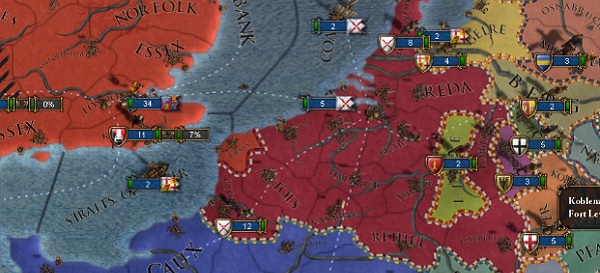Cult Development: A Paradox Profile
Cult adjective rather than cult noun
“We don't want to be a cult.” Shams Jorjani is VP of Acquisition and Portfolio Strategy at Paradox Interactive. He's the guy who reads through and listens to a thousand MOBA pitches and occasionally finds a Teleglitch hidden behind them. He laughs at the cult line as soon as its out there. This, after all, is a company that frequently dresses its employees in coloured wizard robes, faces concealed.
Cultish maybe. Cult adjective rather than cult noun. Bruce Campbell's career rather than Tom Cruise's alternate career.
Jorjani is discussing the company's publishing arm, alongside CEO Fred Wester and COO Susana Meza Graham. Summarised, the message is one of concentrate focus. Paradox know how to make a certain kind of game and it stands to reason that they know how to help external developers who are making that kind of game. On top of that, they want the Paradox brand to mean something to the people who play their games – the logo shouldn't just be a seal of approval, it should be a sign of crossover appeal.
Not that any of the three is likely to use the word “brand” without throwing up scare quotes with their hands or through the inflection of their voice. There's a distinct lack of corporate equivocation, even when all the talk is about the “pillars” of design (not to be confused with the Pillars of Eternity). In fact, when Paradox describe what kind of projects they'd like to publish, they're talking about the kinds of games most of us enjoy – high on replayability, deep, and supportive of the kind of modular design that easily allows for updates and expansions.
The latter might be offputting to those who (sometimes justly) flinch when DLC is mentioned but, as I mentioned in my article about the third anniversary of Crusader Kings II, Paradox are looking to sell and support rather than sell and resell with minor updates a year later. And the reaction when free-to-play is mentioned ranges from wariness to mild hostility. Disregarding the spiffing Magicka: Wizard Wars for now, which seems like an experimental release from a business perspective if not a design perspective, Paradox are staying away from in-game transactions.
But that's not to say they're stuck in a traditional sales model. Quietly – so quietly that nobody really seems to have noticed – they've been recalibrating and reinventing the sales process and digital shelf life for the kind of long-tail game they've been making for almost two decades. To some extent, the quality of Crusader Kings II and Europa Universalis IV is irrelevant to their long-term success. They're the kind of niche games that could find their audience within the first couple of months of release. Even if the niche might be expanding, how are strong sales maintained for three years?
The expansions help. They improve the games, always release alongside free updates, and create fresh conversations about features new and old. That, in turn, provides a new window in which to reach new players, by offering discounts while the conversation is happening. It helps that one of the core pillars of a Paradox games is storytelling – player-led storytelling.
It's no mistake that Paradox were one of the first companies, in my memory, to recognise the potential value of Twitch and YouTube. It'd be easy to look at the moving parts of a game like Crusader Kings II and wonder how video could be an attractive proposition, but strategy Let's Play videos don't need to be flashy - they're the home of commentary, conversation and collaborative thinking. Almost every time I mention a grand strategy game here on the site, someone in the comments or by email will ask for video recommendations.
Those interfaces aren't quite as intimidating when you have a friendly voice in your ear and sometimes you just want to see a pagan empire tormenting the Pope and don't have time to do it yourself.
Combine all of that with comedic trailers that will probably manage to stick in your head even if the jokes don't quite land and you have a recipe for long-term engagement. It should be mentioned that “engagement” is another one of those words that would probably bring out the scare quotes.
On the development side, it's easy to ignore the effort that has gone into establishing and maintaining such a strong profile. The internal Paradox Development Studio is led by some of the best minds in the business and they have the freedom and resources to experiment within their niche. That's another advantage of the modular design and internal support for long-term expansions.
When I spoke to CK II lead designer Henrik Fåhraeus about the Rajas of India expansion last year, he admitted he'd had to do a fair amount of historical research. He hadn't imagined that adding new cultures, religions and geography would necessarily be viable two years after release. Crusader Kings II, in its current form, does not force the player to engage with either crusades or kings, just as Europa Universalis is continuing to expand options and depth of simulation away from the traditional Old World hub.
The publishing arm of Paradox is a different story.
Four years ago, when I first attended a Paradox Convention, I thought the company was attempting to reinvent its publishing arm as something like a Microprose for the modern PC gaming era. Titles like Warlock: Master of the Arcane and Impire had direct analogues to games from the nineties golden age (Master of Magic and Dungeon Keeper respectively), and the focus on strategy and simulation games fit the mould of Meier's one-time home. Somewhere along the line, the outlook changed. At this year's convention, the portfolio was noticeably streamlined and there were no announcements about new titles.
This may be partly due to the cancellation of Runemaster, an internally developed Norse RPG that was shown at the previous Convention and at last year's Gamescom. While they were happy with some of the systems and ideas, and particularly the theme, Wester says it was hard to find “the fun”. Jorjani claims that Paradox would publish games that didn't live up to expectations again – including Impire, Game of Dwarves and Gettysburg – because the lessons learned were important and best gained through experience. I sense a stronger air of regret around Runemaster, perhaps because it's such a recent project but perhaps also because the effects of cancelling were felt closer to home.
One result of that cancellation is a stronger focus on what is happening rather than what might be happening. There are games in development, but we're not told what they are. Not until they're absolutely definitely one hundred percent ready to be revealed, and certain to be released in some form.
The same is true of third party projects. We know about Pillars of Eternity because we already did. Paradox came to the project when it was a known entity and didn't hesitate. Wester says that a journalist asked if he had any doubts when considering working with Obsidian.
“Are you kidding? It's Obsidian. Making an RPG. That's it. I'm there.”
I asked Jorjani about Teleglitch, another game that became a Paradox title after its initial exposure to the public. “I'd love to do more Teleglitch. I think it's the best game we've ever published.”
I'm also interested in licenses. Paradox mostly work with their own intellectual properties, although they make no claim on the IP of titles that they publish rather than develop. In the grand strategy niche that they've made their home, surely there's room for a Warhammer 40K project or...
“There's only one license I'd like to work with.” Wester knows that we know the answer. “I've been a fan since I first started reading the books.”
The license is Game of Thrones. Of course it is. When I first wrote about Crusader Kings II, I said it was the best Game of Thrones game that would ever exist, and I wasn't being enough of a smartarse to consider that somebody would make a total conversion. The base game, unmodded, creates stories packed with incest, betrayal and bloody murder. Kings clash and crows feast.
Wester mentions discussions with HBO, causing me to prepare a newsflash Tweet, but the discussions are about the mod.
“They're not shutting it down. They're just a bit... wary about us monetising it, or if we're marketing it.”
So why not offer to monetise the license by making a bespoke Game of Thrones grand strategy game?
"It would make a great franchise for us, it's just that we just need to get over that inner feeling that [licensing] is not the right thing to do. It's a lot about creative control."
When I speak to Paradox today, I don't see those reflections of Microprose. It's tempting to take qualities like the aversion to free-to-play and dependence on complex PC games, and to draw up a picture of a company that is somehow in thrall to the past. Paradox are looking forward though and even though I feel as if they've applied the brakes a little over the last twelve months, that might be a precautionary measure as they navigate toward the next stretch.
In part two, I'll be digging into the weirder corners of the roundtable discussion, including conversation about the titles that fell by the wayside and a brief psychoanalysis of the company's character.














